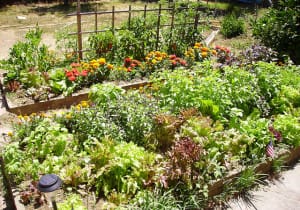Small-scale farmers are producing the majority of the world’s food on just 25% of farmland. GRAIN report says small farms are more productive than large scale industrial monocultures.
Permaculture
by Rozie Apps
 |
Small-scale farmers are using just one quarter, 25%, of the world’s farmland to feed the world!
This atonishing figure comes from a new report by GRAIN, a small international non-profit organisation. They also discovered if China and India are taken out of equation, this figure drops to one fifth!
The extensive report explores farming across the world, from each countries definition of a small farm, to how much food is produced, how much land is actually owned and farmed by these small farms and the changes over the last few decades.
From this report, GRAIN have reported six major conclusions:
1. The vast majority of farms in the world today are small and getting even smaller.
2. Small farms are currently squeezed onto less than a quarter of the world’s farmland.
3. Big farms are getting bigger, and we’re losing more small-scale farmers.
4. Small farms continue to be the main food producers.
5. Small farms are overall more productive than larger farms.
6. Most small-scale farmers are women.
There are various reasons why small-scale farming is important, from growing a range of crops, to providing local jobs, but this report reveals that even with such a small percentage of land, these small farms are producing the majority of the world’s food, which means they feeding us – the most important aspect of all.
In regards to the research surrounding the amount of land small-scale farms are using, GRAIN’s report found:
– in Belarus, on 17% of the land, small farmers are producing 87.5% of fruit and berries, 82% of potatoes, 80% vegetables and 32% of eggs
– in Kenya, with just 37% of the country’s farmland, small farms produce 73% of the agricultural output
– in El Savador, small farmers manage 29% of the land and yet produce 90% of the country’s beans, 84% maize and 51% pork.
These are just a few examples showing how important these small farms are to each country.
GRAIN believe the reason small farms are producing such huge quantities of their countries food is because localised farmers make food production a priority, growing food for local markets and communities. So instead of reaching national statistics, the food is feeding the urban and rural poor. Also, large farms tend to focus on exports, usually crops to feed animals rather than the people, so these products leave the country, offering nothing for the population. GRAIN also reported that these large farms are becoming more common, buying up several small farms and turning them into one large export operation – a devasting blow for local farmers and food production.
Not only are small-scale farms producing the majority of the world’s food, but GRAIN also found that they are more productive than larger farms. Large scale monoculture farming lends itself to higher crop failures because there is a lack of diversity, whereas smaller farms grow a range of crops, and a lot of the time through companion planting which helps prevent diseases and pests. GRAIN found that if all farms in Kenya had the same productivity as the current small farms, agricultural production would double.
In a world of changing climate, food production is changing quickly. Droughts, floods and extreme weather are causing crop failures across the globe. So making sure there are plenty of farmers producing a range of crops, rather than just a handful of big companies, is going to become ever more important.
To read the full report click HERE.

